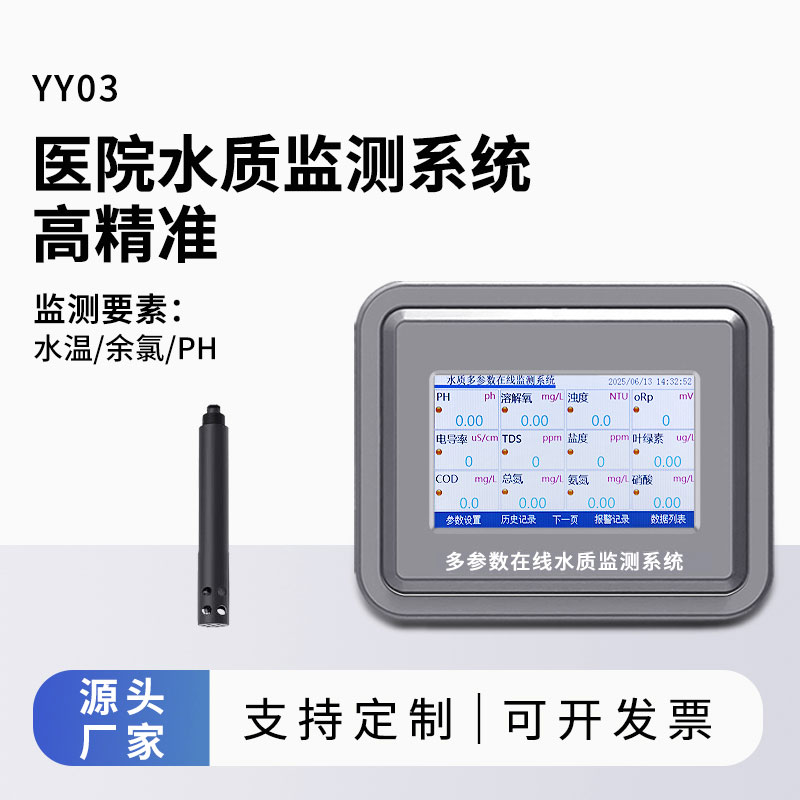Meteorological environment monitoring equipment supplier
Insist on doing high-precision customer favorite technology products

1. Hospital water quality monitoring product introduction
Hospital water quality monitoring is used for real-time monitoring and management of hospital sewage, installed in the main discharge of hospital water treatment.YY03 online Hospital water quality monitoring is an instrument that can monitor water temperature, residual chlorine, and pH online. It integrates the corresponding sensors and measurement module communication storage, and can quickly and accurately record key parameters in the water body. At the same time, the instrument supports the expansion of multi-parameter water quality sensors, including but not limited to pH value, dissolved oxygen (DO), conductivity, turbidity, temperature, ammonia nitrogen, etc., which can be combined and configured according to different needs and applications, record and store historical monitoring data, alarm history records, and support historical data export.xlsx. The RS485 interface supports the MODBUS-RTU communication protocol to facilitate users to communicate freely with PLC, DCS, configuration software, DTU and other devices to connect and transmit data.
2. Hospital water quality monitoring application areas
Online Hospital water quality monitoring is widely used in the monitoring and control of various water bodies, including but not limited to the following areas:
1. Hospital medical wastewater monitoring: used to monitor hospital medical wastewater and domestic sewage, such as water temperature, residual chlorine, pH, etc., to ensure that it is harmless to the human body and the environment.
2. Groundwater monitoring: used to monitor groundwater parameters such as pH value, conductivity, temperature, etc., so as to detect and solve water quality problems in time.
3. River and lake monitoring: used to monitor the water quality of rivers and lakes, such as dissolved oxygen, turbidity, ammonia nitrogen and other parameters, so as to take timely pollution control measures.
4. Ocean monitoring: used to monitor the water quality of the ocean, such as salinity, dissolved oxygen, temperature and other parameters, so as to timely detect and control marine pollution.
5. Sewage treatment: used to monitor sewage water quality parameters, such as pH, COD, ammonia nitrogen, etc., in order to control and adjust the sewage treatment process.
6. Industrial production: used to monitor water quality in industrial production processes, such as pH, conductivity, dissolved oxygen and other parameters, so as to adjust the process in time and ensure product quality.
7. Water plant: used to monitor the pH value, dissolved oxygen, turbidity and other parameters of tap water to ensure the safety and hygiene of tap water.
8. Scientific research: used for water quality monitoring in the field of scientific research, such as lake eutrophication, climate change, etc.
3. Technical characteristics of hospital water quality monitoring
1. High reliability: suitable for long-term work in the field environment, stable measurement and strong anti-interference ability.
2. Flexible and portable: Each probe can be freely combined, replaced independently, and plug and play.
3. Scalability: Various sensors can be freely combined.
4. Multiple applications: on-site rapid measurement, emergency monitoring, or long-term online monitoring of groundwater, river water, lake water, and urban pipe network water.
5. Tough shell: ABS+PC material, corrosion-resistant, can work normally for a long time.
6. Compact structure: can be installed in small places.
7. Communication connection: RS485 expansion interface, master/slave interface isolation and independent communication.
4. Technical parameters of hospital water quality monitoring
| Display Output | 4.3-inch touch screen with strong LED backlight, can be operated under direct sunlight |
| power supply | DC power supply: DC12V |
| Power consumption | The power consumption of the instrument is about 12V/1W |
| Sound Output | buzzer |
| Communication Protocol | Standard RS485 Modbus-RTU protocol and device master/slave transmission channel support |
| Main Materials | ABS+PC material |
| Storage temperature | -20 to 70°C |
| Operating temperature | -10 to 50°C |
| Protection level | IP65 |
| size | 175mm*140mm*49mm(length×width×height) |
| weight | About 0.5KG |
5. Hospital water quality monitoring sensor configuration
| Model | Name | Measurement range | Principle | Measurement accuracy | Resolution | Is it standard equipment | Note |
| S4 | Residual chlorine | 0~5.00mg/L | Ion selective electrode method | ±5% of the reading; ±0.3℃ | 0.01mg/L | √ | Free chlorine pH integrated; Best accuracy at flow rates of 0.42m/s-0.85m/s; With temperature compensation |
| pH | 0~14 (ph) | Electrochemistry (salt bridge) | ±0.1PH;±0.1℃ | 0.01 | √ |